Universal Declaration of Human Rights
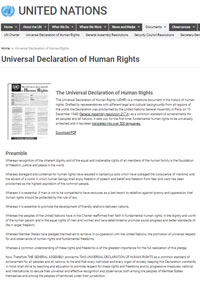
The Universal Declaration of Human Rights (UDHR) is a core document on human rights. The Declaration was decreed by the United Nations General Assembly in Paris on the 10th of December 1948.
For more information please
visit the site
Office of the High Commissioner for Human Rights
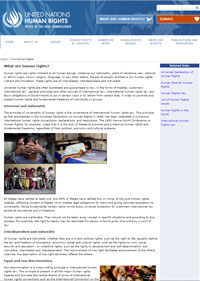
The Office of the United Nations High Commissioner for Human Rights (OHCHR) was created to promote and protect Human Rights. OHCHR provides a forum for identifying, highlighting and developing responses to today’s human rights challenges, and acts as the principal focal point of human rights research, education, public information, and advocacy activities in the United Nations system.
For more information please
visit the site
Council of Europe
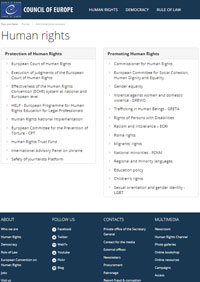
Respect of the European Convention for the Protection of Human Rights and Fundamental Freedoms and, in particular, the judgement of the European Court of Human Rights, is a crucial element of the Council of Europe’s system for the protection of human rights, rule of law and democracy and, hence, for democratic stability in European states.
Also see European Court of Human Rights Database
For more information please
visit the site
Rights Info
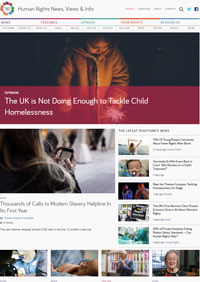
Rights Info is a website focused on bringing human rights to life using infographics, stories and social media. Rights Info is about using social media to find new ways to talk about and deliver human rights stories and information. Rights Info contributes to raising awareness about why human rights matter and how they can change people’s lives.
For more information please
visit the site
Association for the Prevention of Torture
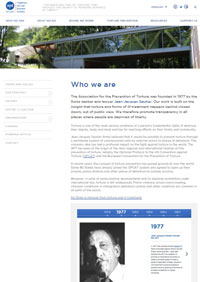
The Association for the Prevention of Torture (APT) works for a torture-free world, where the rights and dignity of all persons deprived of liberty are respected. APT’s mission is to lead and support endeavours to prevent torture and ill-treatment. APT focuses on:
- Strengthening legal and policy frameworks so that torture and other forms of ill-treatment are criminalised and safeguards are in place.
- Improving detention practices to reduce the risk of torture and ill-treatment in police custody and increase protection of all detained persons, particularly those in specific situations of vulnerability.
- Strengthening public oversight, through increased transparency in places of detention and a strong and effective OPCAT system.
For more information please
visit the site
Office for Democratic Institutions and Human Rights (ODIHR)
.jpg)
ODIHR is tasked with assisting OSCE-participating States to ensure full respect for human rights and fundamental freedoms; to abide by the rule of law; to promote principles of democracy; to build, strengthen, and protect democratic institutions; and to promote tolerance throughout their societies. The Office also plays an important role in enhancing dialogue among States, governments, and civil society. The ODIHR organizes the yearly OSCE Human Dimension Implementation Meeting, three supplementary meetings and a seminar, which review governments’ progress and give NGOs a platform to freely voice their concerns.
For more information please
visit the site
Youth for Human Rights
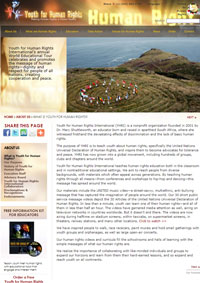
Youth for Human Rights International (YHRI) is a non-profit organization founded in 2001 by Dr. Mary Shuttleworth, an educator born and raised in apartheid South Africa. The purpose of YHRI is to teach youth about human rights, specifically the United Nations Universal Declaration of Human Rights, and inspire them to become advocates for tolerance and peace.
For more information please
visit the site
United for Human Rights
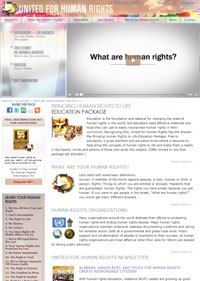
United for Human Rights (UHR) is an international, not-for-profit organization dedicated to implementing the Universal Declaration of Human Rights at the local, regional, national, and international levels. UHR’s membership is comprised of individuals, educators, and groups throughout the world who are actively forwarding the knowledge and protection of human rights. Its purpose is to provide human rights educational resources and activities that inform, assist, and unite individuals, educators, organisations, and governmental bodies in the dissemination and adoption of the Universal Declaration of Human Rights at every level of society.
For more information please
visit the site
International Justice Resource Center
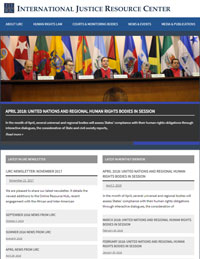
The International Justice Resource Center (IJRC) provides advocates, civil society organizations, and victims of human rights abuses with the information and resources they need to effectively use international legal protections, including advocacy before human rights monitoring bodies and complaints before international and domestic courts, to bring about justice and accountability for human rights violations. IJRC provides educational materials, training workshops, and advice to individuals and groups around the world.
For more information please
visit the site
International Federation for Human Rights
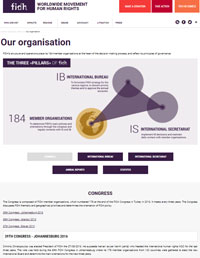
FIDH is an international human rights NGO federating 178 organizations from 120 countries. Since 1922, FIDH has been defending all civil, political, economic, social, and cultural rights as set out in the Universal Declaration of Human Rights. FIDH acts at national, regional, and international levels in support of its member and partner organisations to address human rights abuses and consolidate democratic processes. FIDH’s work is directed at States and those in power, such as armed opposition groups and multinational corporations. FIDH’s primary beneficiaries are national human rights organisations who are members of FIDH and, through them, the victims of human rights violations. FIDH also cooperates with other local partner organisations and actors of change.
For more information please
visit the site
UNDP-OHCHR Toolkit for Collaboration with National Human Rights Institutions
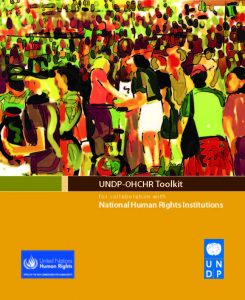
The Toolkit identifies good practices and support strategies for projects aimed at supporting organisational development and capacity assessment generally, with a focus on the two substantive areas of NHRI work:
- Protection mandate: investigations, effective complaints handling strategies, alternative dispute resolution and conflict resolution (at both the individual and community levels), public inquiries and monitoring.
- Promotion mandate: good practices in public education, media relations, advice and assistance to government, reports, policy development, and programs of cooperation that can “leverage” resources and achieve broader impact.
For more information please
download the document Eng
Working with the United Nations Human Rights Programme: A Handbook for Civil Society
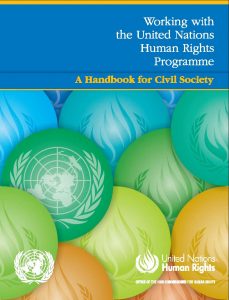
Working with the United Nations Human Rights Programme: A Handbook for Civil Society is addressed to the civil society actors who, every day in every part of the world, contribute to the promotion, protection and advancement of human rights. Developed following a survey among users of the first edition of the Handbook—Working with the Office of the United Nations High Commissioner for Human Rights: A Handbook for NGOs (2006)—this comprehensively updated and revised second edition puts United Nations human rights bodies and mechanisms at its centre. Speaking to all civil society actors, including but not only non-governmental organizations (NGOs), the Handbook explains how civil society can engage with various United Nations human rights bodies and mechanisms.
For more information please
download the document Eng
International Human Rights Standards for Law Enforcement: A Pocket Book on Human Rights for the Police
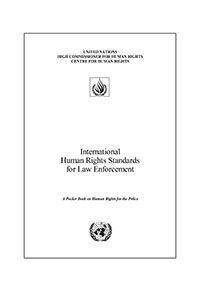 This "pocket book" is designed to provide a readily accessible and portable reference for police committed to the lawful and humane performance of their vital functions in a democratic society. The pocket book contains hundreds of relevant standards, reduced to common language and point-form, and drawn from over thirty international sources.
This "pocket book" is designed to provide a readily accessible and portable reference for police committed to the lawful and humane performance of their vital functions in a democratic society. The pocket book contains hundreds of relevant standards, reduced to common language and point-form, and drawn from over thirty international sources.
For more information please
download the document Eng
Paris Principles
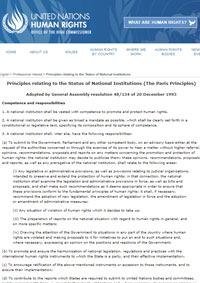
Paris Principles (resolution 48/134) are principles relating to the Status of National Human Rights Institutions. They were adopted by the General Assembly on 20th of December, 1993.
For more information please
visit the site
International Coordinating Committee of NHRIs
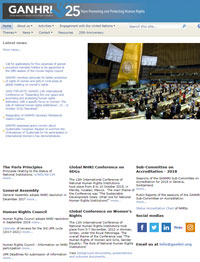
The International Coordinating Committee for National Human Rights Institutions (ICC) is the international association of national human rights institutions (NHRIs) from all parts of the globe, established in 1993. The Committee promotes and strengthens NHRIs to be in accordance with the Paris Principles and provides leadership in the promotion and protection of human rights.
The ICC:
- Facilitates and supports NHRI engagement with the UN Human Rights Council and Treaty Bodies
- Encourages cooperation and information-sharing among NHRIs, including through an annual meeting and biennial conference
- Undertakes accreditation of NHRIs in accordance with the Paris Principles
- Promotes the role of NHRIs within the United Nations and with States and other international agencies
- Offers capacity-building in collaboration with the Office of the High Commissioner for Human Rights (OHCR)
- Assists NHRIs under threat
- If requested, can assist governments to establish NHRIs
Regional NHRI Networks and Forums
- European Group of National Human Rights Institutions
- Asia Pacific Forum
- Network of African Human Rights Institutions
- Network of National Institutions for the Promotion and Protection of Human Rights in the Americas
- Commonwealth Forum of National Human Rights Institutions
- Arab-European Human Rights Dialogue
For more information please
visit the site
National Human Rights Institutions Database
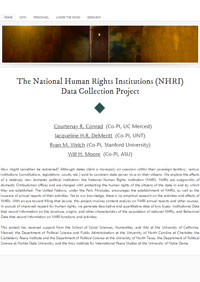
The Raoul Wallenberg Institute’s NHRI Database holds over 1 500 documents relating to National Human Rights Institutions. These documents are materials produced by NHRIs themselves (annual reports, thematic guides and studies, national inquiries, etc.) and UN documents, or scholarly articles related to National Human Rights Institutions. The objective of the Database is to make NHRI materials available to a wider audience and to generally promote the work of NHRIs around the world. The database also allows NHRIs to share best practices and for scholars and researchers to access relevant documents.
For more information please
visit the site
Legislating for the Security Sector Toolkit: 10 Basic Human Rights Standards for Law
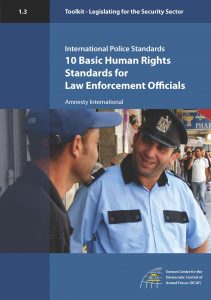
These ‘10 Basic Human Rights Standards for Law Enforcement Officials’ were prepared by Amnesty International in conjunction with police officials and experts from different countries. They are based on United Nations law enforcement, criminal justice and human rights standards. This document is intended to raise awareness amongst government officials, parliamentarians, journalists and non-governmental organizations of some fundamental standards which should be part of any police training and police practice.
For more information please
download the document Eng
Security Sector Reform and Gender Toolkit
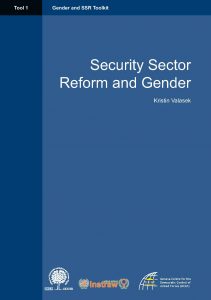
This Toolkit is an initial response to the need for information and analysis on gender and SSR. It is designed to provide policymakers and practitioners with a practical introduction to why gender issues are important in SSR and what can be done to integrate them. Each SSR context is unique. As such, the strategies and recommendations provided in the Toolkit may not always be directly applicable and should always be adapted to the local context.
Also see, SSR and Gender Toolkit: Practice Notes
For individual Tools and Practice Notes see here.
For more information please
download the document Eng
Gender and SSR Training Materials
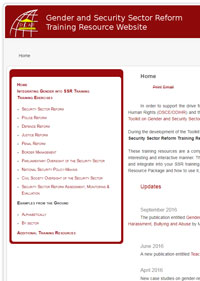
In order to support the drive for gender-responsive SSR, the Geneva Centre for the Democratic Control of Armed Forces (DCAF), the OSCE Office for Democratic Institutions and Human Rights (OSCE/ODIHR), and the United Nations International Research and Training Institution for the Advancement of Women (UN-INSTRAW, now part of UN Women) published a Toolkit on Gender and Security Sector Reform in February 2008.
These training resources are a companion to the SSR and Gender Toolkit. They are designed for SSR trainers and educators to help you present material on gender and SSR in an interesting and interactive manner. The Gender and SSR Training Resource Package contains a wide range of exercises, discussion topics, and examples from the ground that you can adapt and integrate into your SSR training. Gender trainers working with the security sector will also find the content useful.
For more information please
visit the site
Gender and Complaints Mechanisms: A Handbook for Armed Forces and Ombuds Institutions
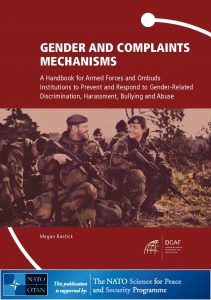
This handbook brings together knowledge and experience as regards prevention of misconduct, and handling and monitoring of complaints within armed forces, with particular regard to gender. The Handbook is a resource for armed forces, ministries of defence, ombuds institutions and others that manage and oversee armed forces in:
- establishing a safe and non-discriminatory environment for men and women in the armed forces;
- dealing with instances and complaints of gender-related discrimination, harassment, bullying and abuse in the armed forces; and
- monitoring and overseeing the handling of instances and complaints of gender-related discrimination, harassment, bullying and abuse in the armed forces.
Integrating Gender into Internal Police Oversight
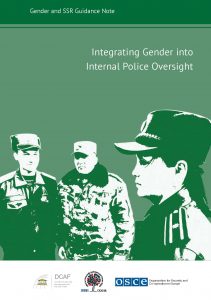
Designed as a complement to the DCAF, OSCE/ODIHR, UN-INSTRAW Gender and Security Sector Reform Toolkit, and DCAF’s Gender Self-Assessment Guide, the guidance notes focus on integrating gender into systems and processes within police services and armed forces, and on equipping external oversight bodies, such as Ombuds institutions and national human rights institutions, to appropriately prioritise gender.
Gender Self-Assessment Guide for the Police, Armed Forces and Justice Sector
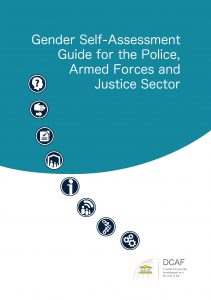
This self-assessment guide is a tool for assessing the gender responsiveness of a security sector institution. A gender-responsive security sector institution is one that both meets the distinct security and justice needs of men, women, boys and girls and promotes the full and equal participation of men and women. While it can be used by other security sector institutions, the guide is particularly designed for use by police services, armed forces and justice sector institutions, and those working with them.



